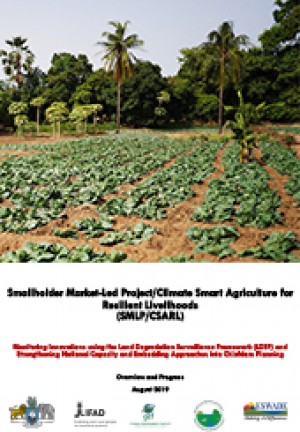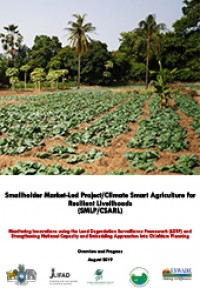RFS Eswatini wins 2020 Temvelo Award for achievements in biodiversity conservation
12 March 2021
Project Name
Climate-Smart Agriculture for Climate-Resilient Livelihoods (CSARL)
GEF Implementing Agency
IFAD
Objective
To enhance the food and nutrition security, as well as promote the livelihoods of smallholder farmers, through diversified, climate-resilient agricultural production practices and associated market linkages.
Project Targets
land under integrated and sustainable management
GHG emissions avoided or reduced
beneficiary households
Eswatini faces the interconnected challenges of rural poverty, food insecurity and environmental degradation. The main drivers of environmental degradation in eSwatini are increasing human population, soil nutrient mining within farmlands, growing livestock populations on communally grazed rangelands, land tenure arrangements, deforestation and climate change. These drivers have led to reduced natural resources, biodiversity, and ecosystem services—all essential for agricultural productivity. The result increase food insecurity for smallholder farmers and contribute to rural poverty and climate change vulnerability.
To address the interconnected challenges of rural poverty, food insecurity and environmental degradation, the Government of Eswatini, through the Resilient Food Systems programme, aims to introduce a paradigm shift toward integrated, multi-stakeholder development planning at the local level. This planning approach aims to ensure land, water and other natural resources are sustainably managed and harnessed as key drivers of growth.
The project is structured around three principal components:
The project draws on IFAD’s experience of similar projects in Eswatini and deepens the understanding of how to address food security nationally through integrated approaches. The CSARL project is closely associated with IFAD’s Smallholder Market-Led Program (SMLP), which strengthens market linkages and promotes the scaling-up of resilient and sustainable agricultural production practices and approaches.
The project aims to meet the following targets:
Chiefdom Development Planning process institutionalised in three of the four regions in the project area.
Sustainable Land Management (SLM) applied at multiple scales across 37 Chiefdoms in three regions.
National capacity developed to monitor and refine SLM policies and programmes
The Ministry of Finance provides oversight and liaises with IFAD and GEF for project implementation. Major stakeholders at the national level include the Ministry of Agriculture, Eswatini Water and Agriculture Development Enterprise, Eswatini Environment Authority and the Eswatini Meteorological Service. The Rural Development Areas, local NGOs, and the Inkhundla (Parliamentary Constituency) play key roles in activities at the chiefdom level.
Each RFS country project conducts activities that fall under common thematic areas within the programme. Explore each project theme relevant to the RFS eSwatini country project below to see which activities are being implemented under each theme.
Stories from the Field
Explore our stories from the field to learn more about the activities, milestones, lessons learned, and achievements of the RFS eSwatini project.
Relevant Resources
We have a growing library of reports, briefs, case studies, media, tools and guidelines. Explore all resources related to the RFS eSwatini project to get greater insight into our programme activities.


Implemented by IFAD, the objective of the CSARL project is to enhance the food and nutrition security, as well as promote the livelihoods of smallholder farmers, through diversified, climate-resilient agricultural production practices and associated market linkages. This factsheet provides an overview of the project, outlining the various components, stakeholders, and anticipated impacts, as well as key innovative elements within the project design and implementation.


This briefing note focuses on the Multidimensional Poverty Assessment Tool (MPAT) and its use by the Resilient Food Systems (RFS) projects in Kenya and Eswatini in conducting baseline surveys focusing primarily on socio-economic data. The MPAT survey collects information on 1) rural assets, exposure, and equality; and 2) fundamental needs, such as food and nutrition security, education, and healthcare. Additional questions on soil and water conservation practices were added to the survey conducted in Kenya. This tool is relatively easy to use, requires few resources to implement, and provides users with a reliable and comprehensive picture of a community’s poverty situation.


In parallel to the UNCCD COP14, held in New Delhi in September 2019, IFAD, with support from GEF and in collaboration with the Resilient Food Systems PCU, held a side event entitled “Fostering an integrated approach for sustainable land management in sub-Saharan Africa”. The side event featured presentations from RFS country project teams from Eswatini, Niger and Uganda.
The Knowledge Centre is a central platform for sharing resources and information generated by the 12 Resilient Food Systems country projects and Regional Hub.
Within the Knowledge Centre, you can find helpful resources, tools, case studies, and news stories related to the different countries and themes of the Resilient Food Systems programme.